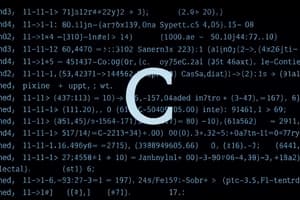Podcast
Questions and Answers
What are the different types of operators and expressions covered in Module-II?
What are the different types of operators and expressions covered in Module-II?
The different types of operators and expressions covered in Module-II are: Arithmetic Operators, Relational Operators, Logical Operators, Type Conversion, Increment Decrement Operators, Bitwise Operators, Assignment Operators, and Conditional Operators.
Explain the concept of Little Endian and Big Endian in the context of Data Type and Sizes.
Explain the concept of Little Endian and Big Endian in the context of Data Type and Sizes.
Little Endian and Big Endian refer to the byte order in which multibyte data types are stored in computer memory. In Little Endian, the least significant byte is stored first, while in Big Endian, the most significant byte is stored first. This difference is important when data is being transferred between systems with different byte orders.
What is the significance of proper variable naming and Hungarian Notation in programming?
What is the significance of proper variable naming and Hungarian Notation in programming?
Proper variable naming and Hungarian Notation are important in programming as they help in making the code more readable and understandable. It also helps in avoiding naming conflicts and enhances code maintainability and reusability.
What is the result of the expression $5 imes 3 / 2 + 7 - 1$?
What is the result of the expression $5 imes 3 / 2 + 7 - 1$?
What is the value of $x$ after the following operations: $x = 5; y = ++x + x++;$?
What is the value of $x$ after the following operations: $x = 5; y = ++x + x++;$?
In the context of bitwise operators, what does the expression $12 ext{ | } 9$ evaluate to?
In the context of bitwise operators, what does the expression $12 ext{ | } 9$ evaluate to?
Flashcards are hidden until you start studying
Study Notes
Module-II Operators and Expressions
- Module-II covers various types of operators and expressions
Endianness and Data Type Sizes
- Little Endian: stores the least significant byte of a multi-byte value at the lowest memory address
- Big Endian: stores the most significant byte of a multi-byte value at the lowest memory address
- Endianness affects data type sizes and representation in memory
Variable Naming Conventions
- Proper variable naming is significant for code readability and maintainability
- Hungarian Notation: a convention for naming variables to indicate their data type and usage
Evaluating Expressions
- The expression
$5 \* 3 / 2 + 7 - 1evaluates to 18- Follows the order of operations (PEMDAS): multiplication, division, addition, subtraction
Increment Operators and Assignment
- The expression
x = 5; y = ++x + x++;results iny = 12andx = 7- Prefix increment operator
++xincrementsxbefore using its value - Postfix increment operator
x++incrementsxafter using its value
- Prefix increment operator
Bitwise Operators
- The expression
12 | 9evaluates to 13- The bitwise OR operator
|performs a binary operation on the operands
- The bitwise OR operator
Studying That Suits You
Use AI to generate personalized quizzes and flashcards to suit your learning preferences.




